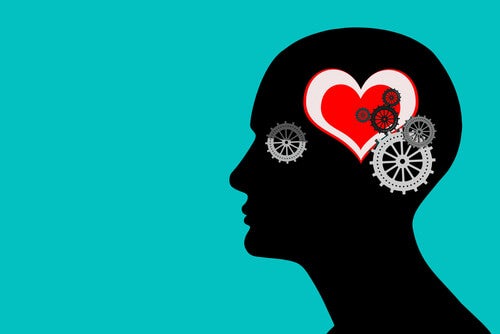Definition and Characteristics of Cognitive Rigidity


Written and verified by the psychologist Valeria Sabater
Cognitive rigidity is a characteristic of people who are captive to their own behavioral patterns. They’re those who don’t accept new perspectives. In fact, these people don’t tolerate changes at all. This is probably because they don’t understand that mental flexibility is essential for a healthy life. That is, that one must build healthy interpersonal relationships in order to face adversity.
You’re probably thinking of someone who checks these boxes. However, everyone exercises cognitive rigidity sometimes. For example, it’s common to think that you can only solve certain things your way. Also, some people are convinced that their values and beliefs are universal truths.
Each person clings to a series of concepts they believe are solid. Yes, some give in to other areas and are open to other opinions and perspectives with ease. Doing so is positive as long as there’s a balance and a tendency towards open-mindedness.
Similarly, those who don’t yield and are prisoners of their same old mental schemes will clearly be uncomfortable. Thus, you must take into account that this characteristic often goes beyond a personality style and could be due to certain disorders. For instance, it could be the result of certain types of dementia, autism spectrum disorder, or obsessive-compulsive disorder.
“The strength of a belief depends on the stories woven around it. Once you have woven enough stories around your belief, even God can’t get you out of it.”
-Shunya-

Three components that define cognitive rigidity
The concept of cognitive rigidity is key to acceptance and commitment therapy. It’s essential for a person to detect these mental inflections. Especially in this type of therapeutic approach framed in what’s known as third-generation therapies (those focused on educating and reorienting a patient’s life from a more holistic standpoint).
Thus, a great part of people’s suffering is due to their own unyielding beliefs. Also, it’s due to those values and schemes people hold on to without even questioning them. They’re the backbone of most people’s lives, in a reality that lacks variety, openness to change, and opportunity.
Therefore, cognitive rigidity is a problem to detect and a bridge to overcome in therapy. Note that this concept is as old as Sigmund Freud’s psychoanalysis. For him, the patient’s resistance to change, the point where certain attitudes emerged, made progress so difficult. This is because they only revealed the surface of a problem.
Similarly, psychologists Robinson, Gould, and Strosahl (2011) explained that cognitive rigidity is defined by three components in their book Real Behavior Change in Primary Care:
They don’t connect with the present, are uncomfortable with it, and fear it
People characterized by psychological rigidity don’t appreciate the present. They live in their own little world and close every window. They don’t admit novelty. Also, these people don’t appreciate an opportunity, don’t tolerate variations, and avoid the unknown and anything unexpected.
Any dynamic capable of breaking their stability scares them.

They can’t recognize priorities
All paths are clear when someone understands their priorities. This is because people who know what’s important to them aren’t afraid to take risks, generate change, and open up to new perspectives. Some which may allow them to grow and look after what they value.
However, a person with cognitive rigidity is limited to following fixed rules – their own. In fact, they’re unable to look beyond their comfort zone and what worries them most is having absolute control over their reality. For example, it makes them incapable of giving in, attending to other people’s needs, being tolerant, and connecting with people by understanding their points of views.
Their relationships progressively lose quality and frustration arises. Then, they begin to let go of many of the things that were important to them. Mainly because they don’t know how to appreciate them.
People with cognitive rigidity can’t tolerate uncertainty
These people just can’t tolerate the unexpected, let alone uncertainty. Thus, something they must understand is that this world is governed precisely by unpredictability. Knowing how to adapt to changes and being able to react in a creative, original, and flexible way allows people to avoid the changes typical of a daily routine.
Also, a person with cognitive rigidity has cognitive closure. This is the need to eliminate any uncertainty or ambiguity that arises in any situation ASAP. They’re those who have the same, and often most extreme, answer to every problem.
They’re also those who, in the face of an argument or disagreement, adopt the least useful or constructive behavior. For instance, they might simply avoid speaking to those who disagree with them.

Are you wondering how to let go of your cognitive rigidity? Well, the aforementioned cognitive-behavioral and commitment therapies are quite useful.
Finally, as a study by Jonathan Greenberg from the Ben-Gurion University of the Negev, Israel, revealed that practices such as mindfulness are good options. They’ll help you train for and adopt a more flexible mental approach.
All cited sources were thoroughly reviewed by our team to ensure their quality, reliability, currency, and validity. The bibliography of this article was considered reliable and of academic or scientific accuracy.
- Greenberg, J., Reiner, K., & Meiran, N. (2010). “Mind the Trap”: Mindfulness Practice Reduces Cognitive Rigidity. PLoS ONE, 5(1). https://doi.org/10.1371/journal.pone.0036206
This text is provided for informational purposes only and does not replace consultation with a professional. If in doubt, consult your specialist.








